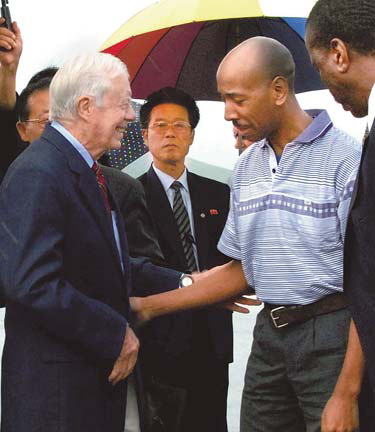Stalled talks get a boost from Carter visit
 |
|
Former US President Jimmy Carter (left) and Aijalon Mahli Gomes talk before they depart from Sunan airport in Pyongyang in this photo released by the DPRK's KCNA news agency on Friday. [Reuters / Kcna] |
The Democratic People's Republic of Korea (DPRK) has shown a lot of enthusiasm for getting back around the negotiating table for denuclearization talks by setting free an imprisoned United States citizen, but the US also has a big role to play if wheels are to be put in motion, according to Chinese experts.
They were reacting to news that Jimmy Carter, the former US president, had personally taken Aijalon Gomes out of the DPRK.
The 31-year-old American, who is reportedly a devout Christian, had been jailed since April after he was sentenced to eight years of hard labor and fined more than $600,000 for trespassing on DPRK territory.
However, it is clear that the DPRK and the US have far different interpretations of the significance of Gomes's release.
Pyongyang has suggested there were heavy political overtones to Carter's visit, saying it "provided a favorable occasion for deepening the understanding and building confidence between the two countries". That enthusiasm was not matched by Washington, which stressed Carter's visit was "unofficial" and "solely for the purpose of bringing Mr Gomes home".
Carter was received in Pyongyang by Kim Yong-nam, president of the Presidium of the Supreme People's Assembly, the country's No 2 official.
He emphasized to Carter his country's determination in denuclearizing the peninsula.
The two sides had an "open-hearted" discussion and exchanged views on DPRK-US relations and the resumption of the Six-Party Talks, according to the DPRK's state media, the Korean Central News Agency.
On the other hand, when asked if Carter's visit heralded other likely connections in the future, the White House stepped back from being linked with Pyongyang.
"The US government did not propose or arrange the trip. The US and North Korea do not have diplomatic relations," the White House said in a statement on Wednesday.
But Chinese experts said, in diplomacy, "no" can sometimes mean "yes".
"Carter's DPRK visit is necessary for both countries. It is certain that the trip was approved and operated by Washington, even though the US would not admit that," Liu Jiangyong, a professor of Asia-Pacific studies at Tsinghua University, told China Daily.
When Carter flew to the country 16 years ago to meet Kim Il-sung, father of the current leader, the two sides signed a nuclear framework agreement.
"Therefore, Carter is the best envoy for communications between the US and the DPRK," Liu said.
Zhang Liangui, an expert in Korean affairs at the Party School of the Central Committee of the Communist Party of China, agreed that the former president is a crucial link.
"Pyongyang hopes in the long term to establish diplomatic relations through a special envoy and Carter is expected to play the role," Zhang said.
But the DPRK's desire for diplomatic relations with the US has, so far, been unfulfilled, the experts said.
"Pyongyang's heart is hot, but Washington's is cold. It represents the distance between their political grounds," said Jin Canrong, associate dean of the school of international relations at the Beijing-based Renmin University of China.
"The DPRK is anxious to get out of international isolation because of its domestic difficulties and that's why it is eager to return to the Six-Party Talks."
The talks were aimed at dismantling the DPRK's nuclear weapons program through negotiations involving the DPRK, the Republic of Korea (ROK), the US, China, Russia and Japan.
After Pyongyang unilaterally pulled out of the talks in April 2009, the likelihood of their resumption was again dented in March when Cheonan, an ROK warship, was torpedoed and 46 sailors died. Seoul and Washington said Pyongyang was behind the incident but Pyongyang refuted the accusation.
However, the gloomy situation brightened Wednesday when media reports from the ROK suggested Seoul no longer regards an apology from Pyongyang for the Cheonan incident as a precondition for getting back to the negotiating table.
"Strictly speaking, the sinking of the Cheonan ... and the resumption of the Six-Party Talks are different in nature," Yonhap News quoted an unnamed official as saying. "The talks are related to denuclearization. Post-Cheonan measures are the security steps we took in the face of the grave matter. It'd be a stretch to establish a direct connection between the two."
On the same day, ROK's foreign minister, Yu Myung-hwan, also named specific actions he would like to see Pyongyang take in connection with its nuclear facilities and denuclearization, but, according to the Yonhap report, Yu did not include anything about the Cheonan sinking in the actions.
Experts said China's shuttle diplomacy shows it is genuine in wanting to get everyone back around the table. But they also agreed that Beijing's influence should not be exaggerated.
"The timetable for a restart will have to be drawn up by the DPRK and the US. China's role, albeit important, is limited," said Liu.
 0
0 






